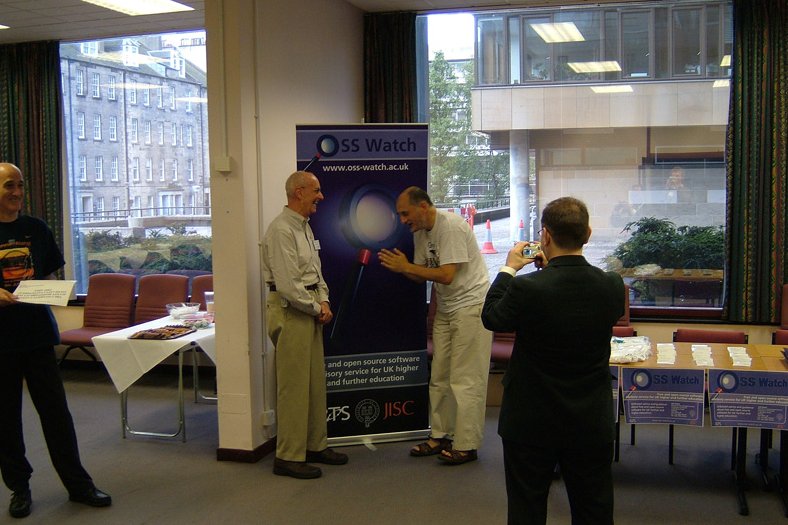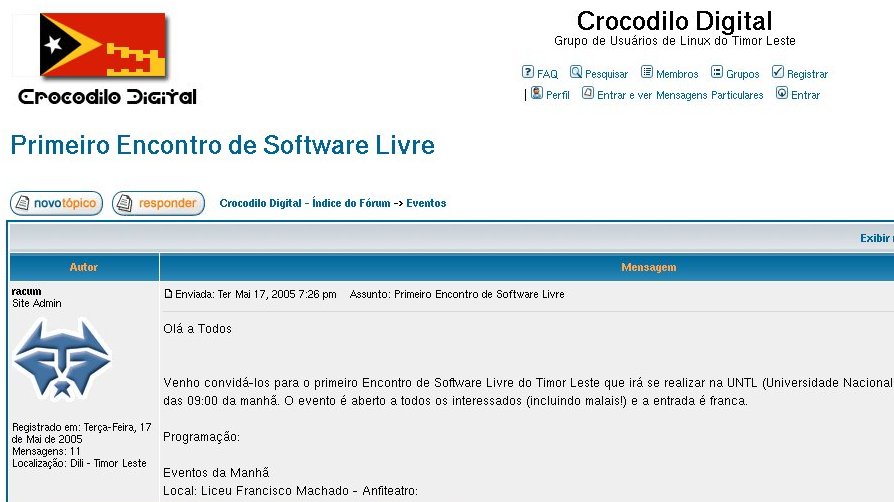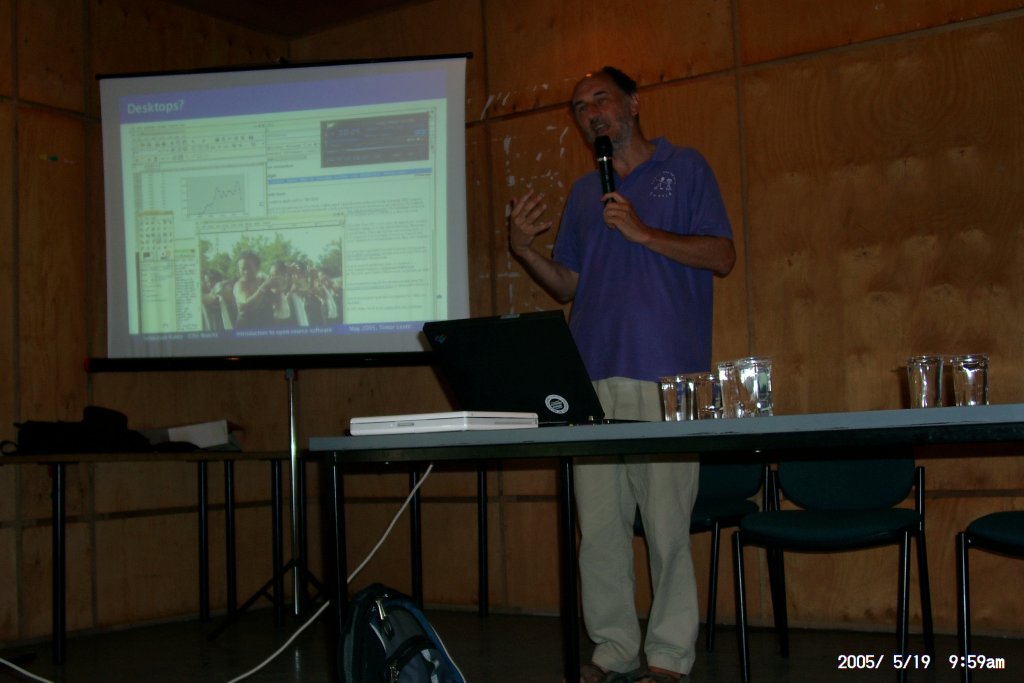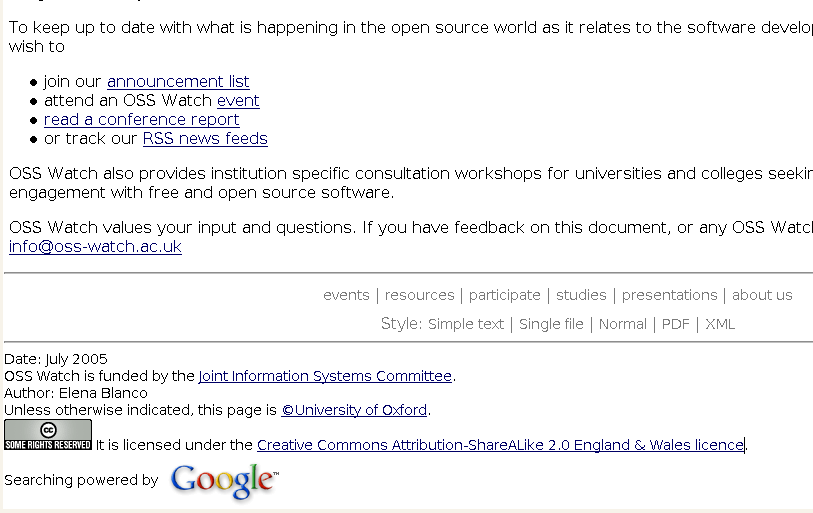Manager's report to OSS Watch Advisory Committee
by Sebastian Rahtz on 1 February 2005
Introduction
OSS Watch report February—July 2005
OSS Watch has had a busy time since February working on:
- briefing papers
- general communications
- presentations
- conferences and workshops
- software distribution
- FE roadshows (on which more anon)
oh, and of course …

Themes
- building communities
- open source policies
- document rigour
- wiki development
Staffing
- To give credit where credit is due:
- Sebastian Rahtz
- Manager (0.4FTE)
- Randy Metcalfe
- Communications Manager (1.0FTE)
- Rowan Wilson
- Research officer (0.5FTE)
- Stuart Yeates
- Research officer (0.5FTE)
- Barry Cornelius
- Development Officer (0.5 FTE)
- Judy McAuliffe
- Administration
- Hannah Dunnington
- Events Management (0.3FTE)
- Elena Blanco
- Documentation editor and author (freelance)
Salary from delayed start of Barry Cornelius pays for commissioned work from Elena Blanco.
Staff Changes
During April and May, Randy Metcalfe took over as Acting Manager while the Manager was in Timor.

OSS Watch Project plan summary
| Briefing material | Ongoing |
| Conferences | Ongoing |
| Evaluation | Summer 2005: scheduled for September 2005 |
| International Conference | February/March 2006 |
| Project support | Ongoing |
| Reports to JISC | Ongoing |
| Collaboration | Ongoing |
| FE roadshows | Activity ended in July 2005 |
| Demonstration Software | Ongoing |
| Survey | Autumn 2005 |
| Website | Ongoing |
| Workshops | Ongoing |
Briefing notes since February
- Creative Commons and Open Content
- Linux in a Windows World - review
- A guide to participating in an open source software community
- Open source email clients
- Open source and the web admin
- Software Patents
- UK Patent Office Technical Contribution Workshop - report
- A Guide to Open Source Software for Australian Government Agencies - review
- Open source and the web browser
- Knoppix Hacks - review
- Open Source Development - An Introduction to Ownership and Licensing Issues
- FOSDEM - report
Document rigour
All OSS Watch technical writing continues to be prepared in validated XML, and checked by two members of staff.
We have introduced a formal process for the review of our published documentation in order to ensure its continued accuracy and relevance. All documents are now reviewed on a 6-monthly basis and archived or rewritten if required.
Licensing comes later.
Published articles
Article in Physics World insert “Software Challenges and Solutions” page 6, June 2005 http://physicsweb.org/articles/world/18/6/34/1
Choosing Open Source Solutions 05 July, 2005 http://www.elearning.ac.uk/features/oss
OSS Watch in the press
- Egov Monitor, 23 June 2005
- Letter to the editor, Financial Times, 8 June 2005
- RSC Northern Ireland newsletter, June 2005
- Open source software alternatives help universities focus on what works, Innovations Report, 29 April 2005
- A Path Through The Intellectual Property Rights Swamp, Managing Information, 28 April 2005
- A Path Through The Intellectual Property Rights Swamp, JISC website, 19 April 2005
Conference, July 4th 2005: Building Open Source Communities
- What is an open source software community? Sebastian Rahtz, Manager, OSS Watch
- Licences, Features, and Community: The Path to Sustainability Jim Farmer, Community Liaison, Sakai Educational Partners Program
- Co-located agile development Helen Sharp, The Open University
- Serving Maths: Experiences from a JISC Distributed e-Learning Project Gustav Delius, University of York
- Life and times in the Apache community Andrew Savory, Director, Luminas
- MoodleMoot: Meeting Real People from a Virtual Community Sean Keogh, UK Moodle Partner
On the day

Community tensions

Collaboration (1)
- Queen Mary University - half-day workshop on licensing
- Australian Government Management Information Office - half-day discussion
- JISC Mirror Service - steering group
- Digital Curation Centre - document consultation
- Bodington VLE project - ongoing building communities and licensing consultation
- UKOLN - planning stages of joint Creative Commons workshops
- JISC IPR Consultation workshops - invited participation
- JISC Click project - consultation
- British Computer Society - Open Source Special Interest Group
- Oxford University Computing Services — Linux desktops
The digital crocodile

Australian Morals
- Open Source Western Australia: advising local business on OSS, doing a physical roadshow soon
- UWA open source policy: http://www.uwa.edu.au/it/policy/existing/opens
- Melcoe, Sydney: important experiment in business model with LAMS
- Melcoe funded to run AskOSS, an OSS Watch-like service
- Australian Government involvement in Squiz.net licensing wars. 2.8 You must Notify Squiz.Net within 30 days of making any Modifications even if You do not intend to distribute those Modifications. Notify is defined in Clause 4.2 below. If Your Modifications are incomplete, You must still Notify Squiz of the status of your progress not less frequently than once every 30 days.
Questions from Linux desktop work at Oxford
- What distros are used at Oxford?
- What releases of distros are used?
- How did they choose a distribution?
- What is the most used distribution?
- Who uses the Linux desktop?
- Who has root access?
- How are machines patched?
- When do machines get OS releases?
- What software is installed?
- What discipline-oriented software?
- Can other software be installed?
- Can the desktop run a webserver?
- Can the user access MS Windows?
Collaboration (2)
- Open Source Skills Committee – developing skills framework, with Open Forum Europe, UKUUG, OpenAdvantage, Sun, HP and others
- Moodle - meeting with Martin Dougiamas and participation in MoodleMoot 2005
- LAMS – business models
- Educause – OSS Watch invited to blog on their site
- OMII - consultation on OMII future plans
- CCLRC - licence discussions and planning IPR workshops
- SIGOSSEE - German translations of OSS Watch briefing documents
- GNU EPrints – building communities consultation
- JISC eLearning programme – ongoing consultation
Educause Blog
Stuart Yeates has been a regular blogger on the Educause site since May 1st, and has clocked up 118 entries, making him one of their star providers.

JISC
- The JISC open source policy is still waiting to be released. …still…
- A Senior Management Briefing paper was prepared in July 2005 for the JISC Communications Team and it is expected that this will be published in October 2005, with associated guidance materials on licensing.
- Plenty of work with JISC-funded projects
We even wear the T-shirt

An institutional policy? 1. Procurement
Within the framework of demand and value, the single most important consideration is the preservation of data and the interoperability of systems.
-
New software acquisitions should demonstrate conformance to relevant open standards and interoperability with open systems. At each point on the procurement and deployment chain, software should be assessed on its merits. Thus:
-
Open source and proprietary software options should be assessed using the same criteria, including total cost of ownership over the expected lifetime of the deployment.
These are also the first two points of Open Source Software: Use within UK Government.
An institutional policy? 2. Intellectual Property
Acknowledge the potentially significant role played by open source methodologies in terms of exploitation routes:
- Software development must include maintenance of a register of intellectual property rights (IPR).
- Publicly-funded software development should include an exploitation plan.
- Open source must be available as an exploitation method, and should be the default method where no alternative is proposed.
- Income derived from services and training associated with a software product must be shared with the developers using the same system as that used for patents.
- When selecting an open source licence, the institution should ensure that it has the right to use all future versions of the software.
An institutional policy? 3. The use of open source software
Participation in, and contribution to, open source software projects should be a normal part of the working life of IT-related staff, and this must be reflected in employment policy and employment contracts. There must be procedures in place so that staff can do work on open source projects in good conscience, without removing the protection afforded to the institution by retention of copyright.
An institutional policy? 3. The use of open source software (cont.)
- A register of deployed open source software should be maintained.
- A register of open source software for which staff and students may contribute code, documentation and support must be maintained. It must state whether contributions remain the property of the institution, whether copyright has been assigned to a body maintaining the software, or whether copyright is to be the property of the software developer.
- Staff and students may not contribute institutional intellectual property to open source projects without explicit permission.
Presentations (1)
- 7-8 July 2005, JISC Development Joint-Programmes meeting
- 6-8 July 2005, Institutional Web Management Workshop 2005: Whose Web Is It Anyway?, Manchester
- 29 June 2005, 29 June 2005, TASI seminar: Effective Use of Digital Images in Education Resources, Bristol
- 21-24 June 2005, EUNIS 2005 - Leadership and Strategy in a Cyber-Infrastructure World, Manchester
- 23 June 2005, Oxford IT Support Staff Conference, Oxford
- 23 June 2005, RSC East Midlands e-learning Fair, Derby
- 16 June 2005, RSC Yorkshire & Humberside elearning conference
Presentations (2)
- 15 June 2005, RSC London and Eastern, The Open Source Software Roadshow, London
- 26 May 2005, Open source perspectives from the UK, Queensland University of Technology, Brisbane, Australia
- 24 May 2005, Open Source Software in Education Workshop, Macquarie University E-Learning Centre of Excellence (MELCOE), Australia
- 23 May 2005, Open source perspectives from the UK, Curtin University, Perth, Australia
- 19 May 2005, Introduction to open source software, Software Libre conference, Universidade Nacional de Timor Leste, Dili, East Timor
- 28-29 April 2005, AURIL (Association of University Research & Industry Links) Spring Conference, Edinburgh
Software Livre, in Timor Leste

Presentations (3)
- 12 April 2005, JISC Conference, Birmingham
- 5-6 April 2005, JISC e-Learning Programme Meeting: Framework and Tools and Distributed e-Learning Strands, Birmingham
- 1 April 2005, Open Source Open Minds, The Netherlands
- April 2005, NILTA National Technical Conference
- 22 March 2005, JISC IPR Consultation Workshop: Rights in Digital Environments
- 16 March 2005, Models of Success, RSC Wales, Cardiff
- 15 March 2005, OSS Watch - RSC Roadshow, hosted by RSC North West
- 15 March 2005, RSC West Midlands Annual Conference, Wolverhampton
Presentations (4)
- 14-15 March 2005, Coimbra Group workshops on eLearning Quality in eLearning and Open source/Open standards, Edinburgh
- 11 March 2005, RSC London Moodle Regional User Group
- 3 March 2005, JISC IPR Consultation Workshop: Rights in Digital Environments
- 26-27 February 2005, Free and Open Source Developers’ European Meeting (FOSDEM), Brussels
- 24 February 2005, OSS Watch Advisory Committee meeting
- 23 February 2005, OSS Watch - RSC Roadshow, hosted by RSC East Midlands
Software CDs made available
- Customized releases of Knoppix 3.6 for OSS Watch general release (Moodle, Reload, etc) - 2000 copies distributed
- Bodington Knoppix – 200 copies distributed
- Text Encoding Initiative Members meeting (XML tools)
- TheOpenCD 2.0 – more than 500 copies distributed
Web matters
- Web page redesign
- Wiki introduced (using MoinMoin)
- New navigation routes introduced
Stakeholder-based navigation

Licensing
The OSS Watch plan specified that all documents produced should be released using the GNU Free Documentation License (GFDL). We decided to change to CC UK:
- agreed by the Advisory Committee in February 2005
- agreement sought and received from the University of Oxford Research Services Office
- confirmation of move obtained from JISC programme manager
- relicensing plan implemented for the OSS Watch site in August 2005 The main licence used is Creative Commons Attribution-ShareAlike, whose effect is almost identical to that of the GFDL which it replaces.
Licensing markup in source code
CC display on web

Conclusion
| Briefing material | 9/10 |
| Conferences | 8/10 |
| Evaluation | n/a |
| International Conference | n/a |
| Project support | 8/10 |
| Reports to JISC | 10/10 :-} |
| Collaboration | 7/10 |
| FE roadshows | 6/10 |
| Demonstration Software | 5/10 |
| Survey | n/a |
| Website | 8/10 |
| Workshops | 6/10 |


